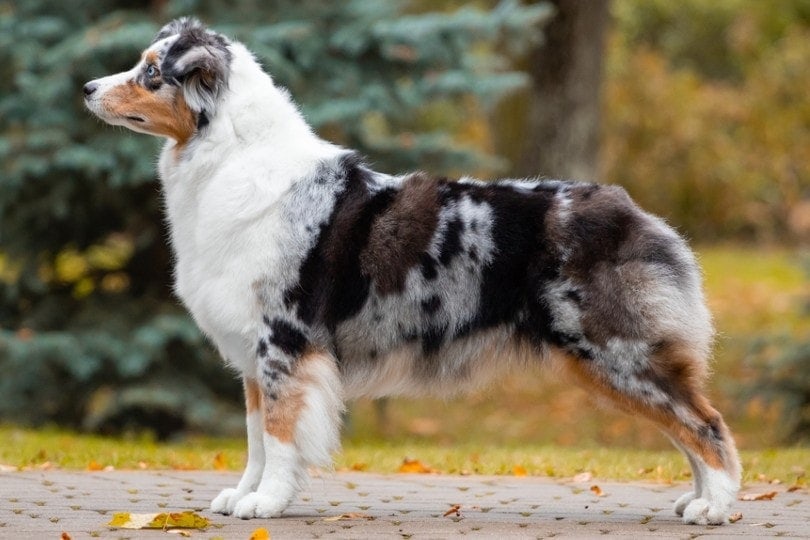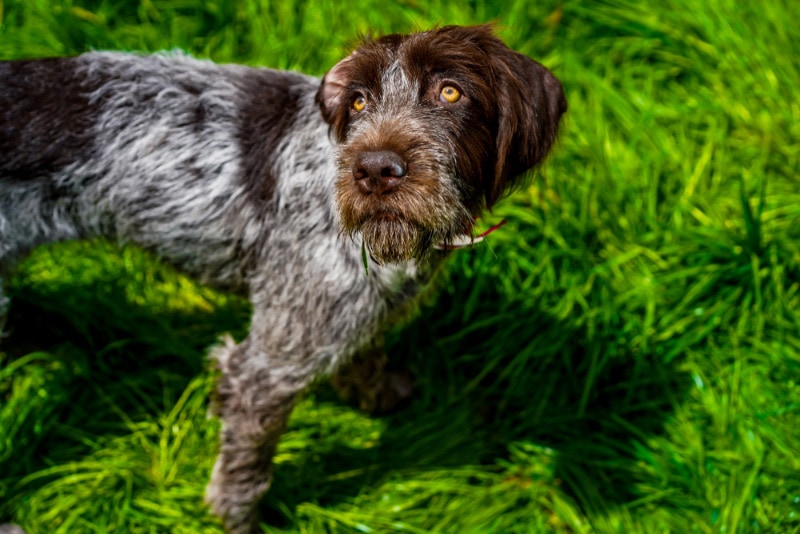Border Collie vs. Husky: The Differences (With Pictures)

Updated on
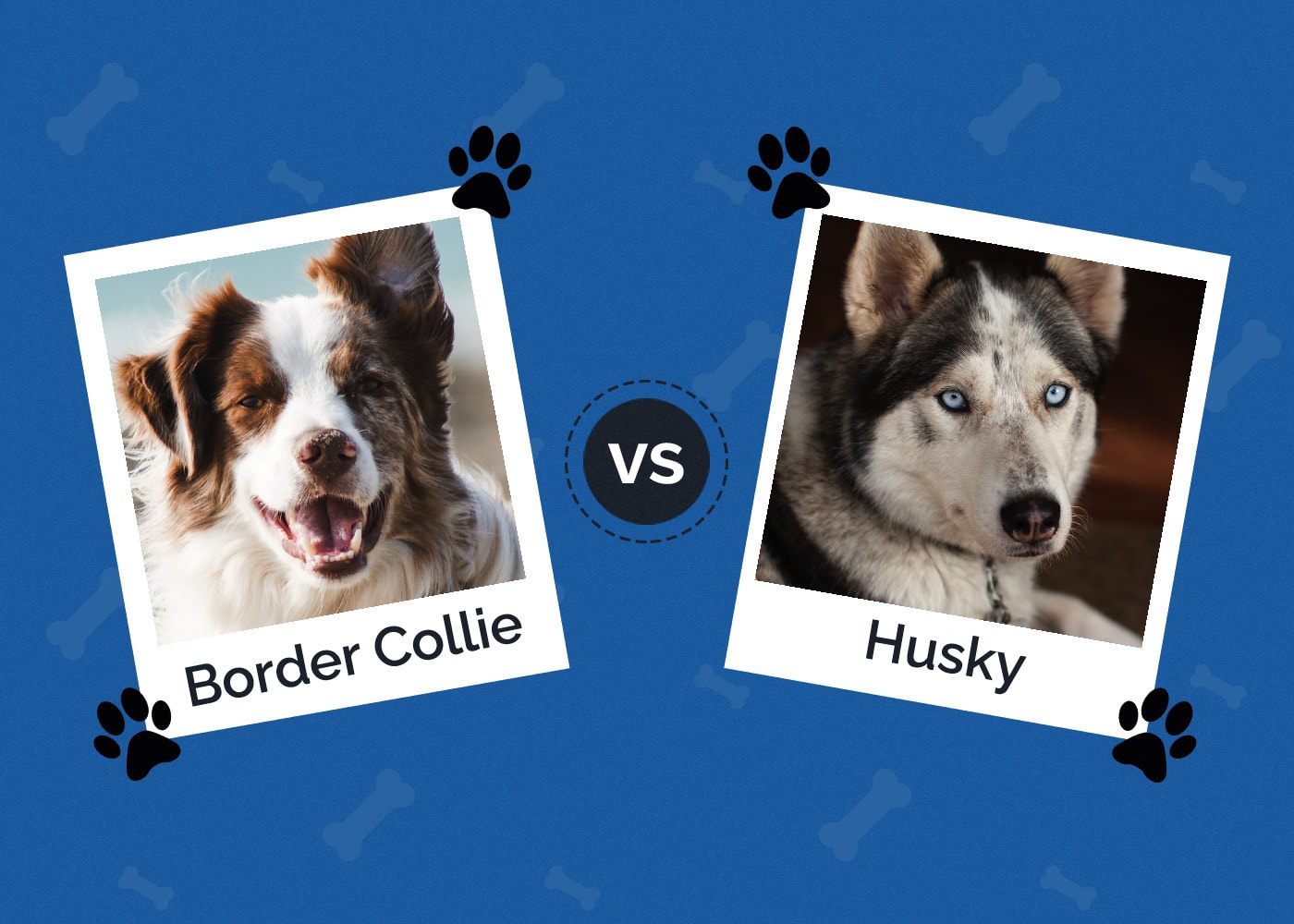
Anyone looking for a dog to share in an active lifestyle will have two near-perfect possibilities in Border Collies and Huskies. Intelligent, loyal, and affable, their company is a treat, whether you’re playing outside or cuddling on the couch. But as undeniable dynamos, these hard-working breeds aren’t for the faint of heart.
Owners need energy and experience regardless of the breed, and the family situation can become a challenge with the wrong pup. Though they share a general zest for life, Border Collies and Huskies have their fair share of unique traits to consider. Knowledge and preparation are vital in ensuring a positive and rewarding experience for your family and your new dog.
Which one is the right dog for you? We’ll help you find out with this in-depth breakdown of Border Collies versus Huskies.
Visual Differences
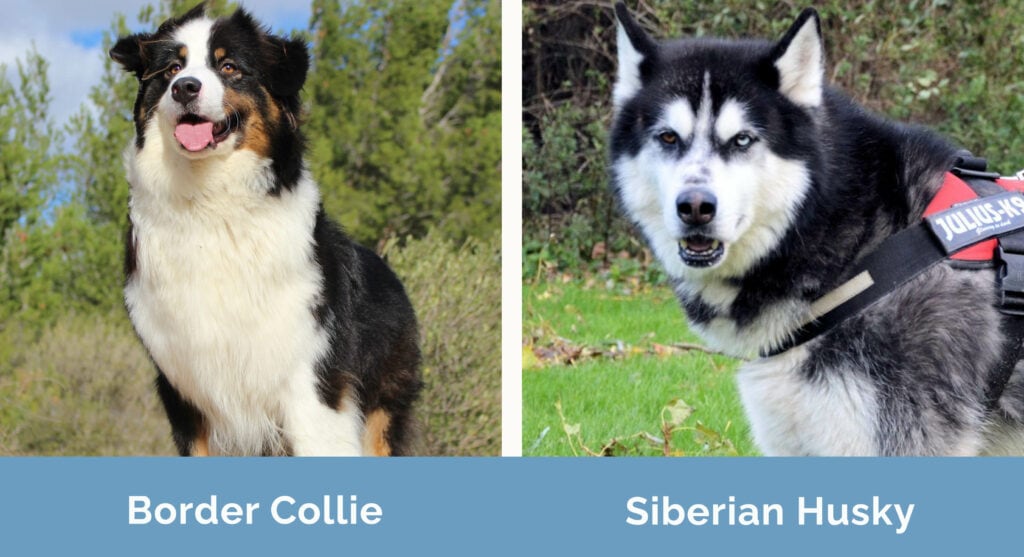
At a Glance
- Average height (adult): 19–22 inches (male); 18–21 inches (female)
- Average weight (adult): 30–55 pounds
- Lifespan: 12–15 years
- Exercise: 2 hours daily
- Grooming needs: Moderate
- Family-friendly: Yes
- Other pet-friendly: Often
- Trainability: Intelligent, loyal, eager to please
- Average height (adult): 21–24 inches (male); 20–22 inches (female)
- Average weight (adult): 35–60 pounds
- Lifespan: 12–14 years
- Exercise: 2 hours daily
- Grooming needs: Moderate
- Family-friendly: Yes
- Other pet-friendly: Often
- Trainability: Intelligent, independent
 Border Collie Overview
Border Collie Overview
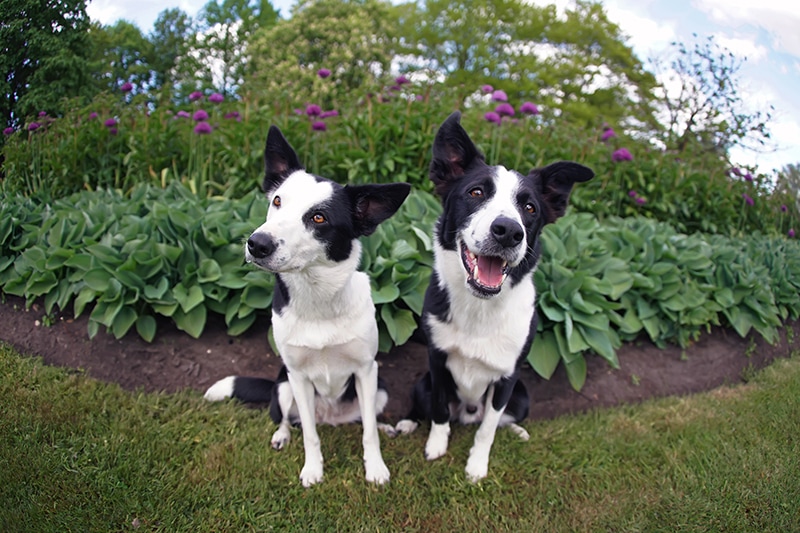
Named for the lowland area between Scotland and England, Border Collies have roots in centuries-old sheepdogs that labored across the region. The breed was one of many Collies with varying physical and behavioral traits according to their location and use on the farm and in the field.
Border Collies owe much of their modern-day popularity to the first sheepdog trials in the 1870s. Their keen intellect went on full display, with an intense, commanding stare and effortless style impressing onlookers and making them the focus of a new group of breeders.
Dismissing conformity, international sheepdog groups appreciated the Border Collie’s herding skills, encouraging breeding according to practical rather than cosmetic traits. Nevertheless, the AKC officially recognized the breed in 1995, signifying a split in standards.
Though diverse in color, build, and behavior, Border Collies share impressive athleticism and unmatched intelligence. A sheep-herding nature honed over generations has made them a highly active and servile breed, bringing unique benefits and challenges to the family context.
Training
Border Collies are remarkably intelligent and endlessly energetic, creating several training hurdles. They learn quickly but can become frustrating if you don’t establish and reinforce boundaries and the chain of command.
Obedience and puppy training classes are a valuable aid for Border Collies. Professional sessions offer one place to iron out their instincts, provide stimulation and structure, and supply socializing opportunities. Likewise, sports and activities such as agility or flyball competitions are ideal ways to boost your Border Collie’s physical, mental, and social health.
Breed Tendencies
Immediate training is essential regardless of age, as is plenty of engagement. Border Collies bore easily. A lack of work, play, or exercise to provide physical and mental stimulation will often lead them to more destructive outlets, like digging through the garden, barking non-stop, or ripping up furniture.
Positive attention, activity, and a sense of duty in the daily routine manage many of the Border Collie’s habits. Other aspects of the dog’s personality may require closer consideration, including:
- Herding: The herding instinct is common, particularly with small children and pets, and you will need to train out or control your dog’s yipping, nipping, nudging, and urge to chase vehicles
- Socialization: Despite their love and loyalty for their owner and family, Border Collies can be jealous, protective, and aloof toward strangers and other animals
- Excitability and Attention: Border Collies are excitable and easily distracted, making household boundaries, appropriate leash etiquette, and short training sessions essential in guiding positive behaviors early
Border Collies need lots of space and positive social experiences. They do well in rural areas with room to run and in urban locations with large, fenced-in yards. Given their quick trigger to herd, chase, and explore, you must ensure your Border Collie stays contained.
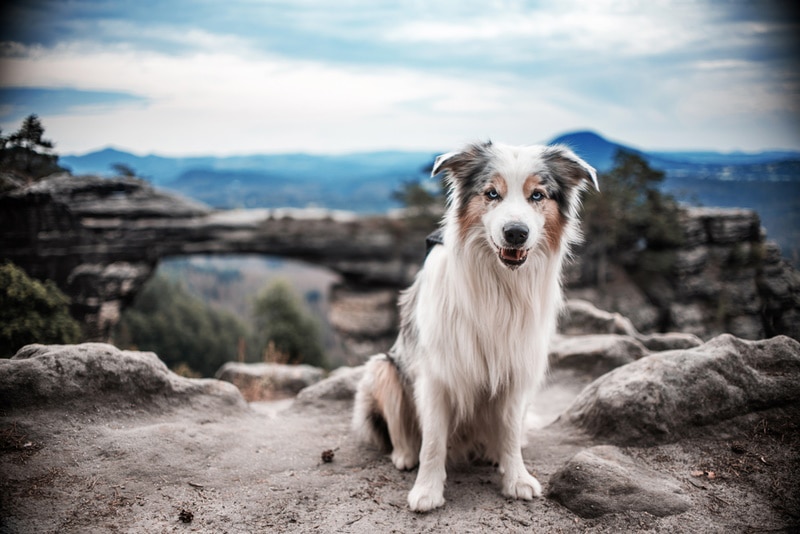
Personality and Intelligence
By many subjective and objective measures, Border Collies are the smartest dogs on the planet. Centuries of breeding, training, and work have made them some of the canine community’s most efficient communicators. Border Collies distinguished themselves in early sheepdog competitions with their ability to effortlessly divide and guide herds with minimal commands.
Recent research revealed the breed’s superior impulse control and advanced ability to learn hundreds of words in short order. Border Collies may require early and ongoing training, but that doesn’t mean it can’t be easy. Their intelligence makes teaching less of a challenge and more of an opportunity. There’s virtually no limit to the commands and tricks they can learn when shown the proper patience.
Border Collies are affectionate and content in the home, offering a bright energy to uplift the atmosphere. They live to please their leader and family, often preferring praise and attention over treats for good behavior.
You must provide positive reinforcement and enough energy to meet their physical demands. Though unruly when left idle, an engaged Border Collie is highly receptive to their owner’s needs.
Grooming
Border Collies can come in various colors in smooth or rough coats. Their double coats can shed a decent amount, particularly during the spring and fall. Their grooming demands are moderate, and they’ll typically need brushing 1–3 times weekly to manage tangles and shedding and a bath every few months. Trimming is unnecessary. Minor touch-ups about the legs are generally the only potential area of concern, even at the show level.
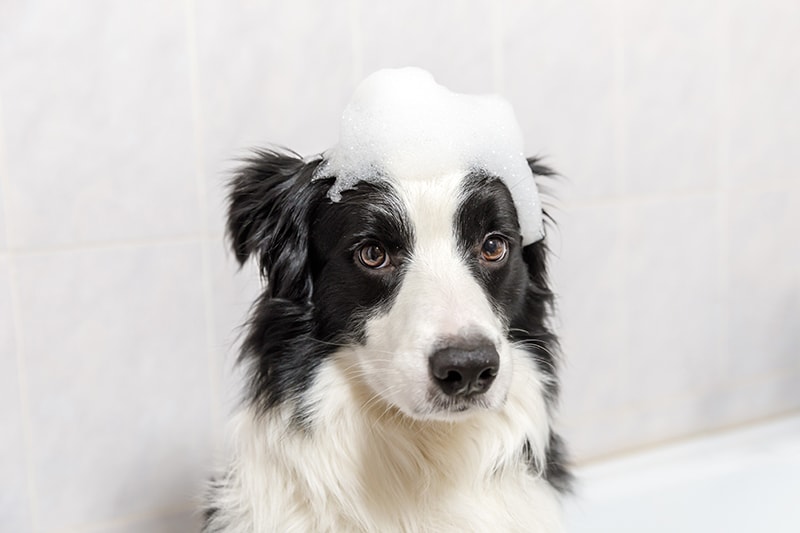
Suitable for:
Border Collies are loyal, upbeat, and ever-present companions when they get enough attention and activity. They need lots of space to run, toys and puzzles to exercise their minds, and an owner with an active lifestyle that can offer at least a couple hours of solid daily exercise. A farm or other working scenario is a natural fit. But if you have prior experience raising dogs and enjoy outdoor sports, hiking, and jogging, a Border Collie could be the perfect addition to the family.
Husky Overview
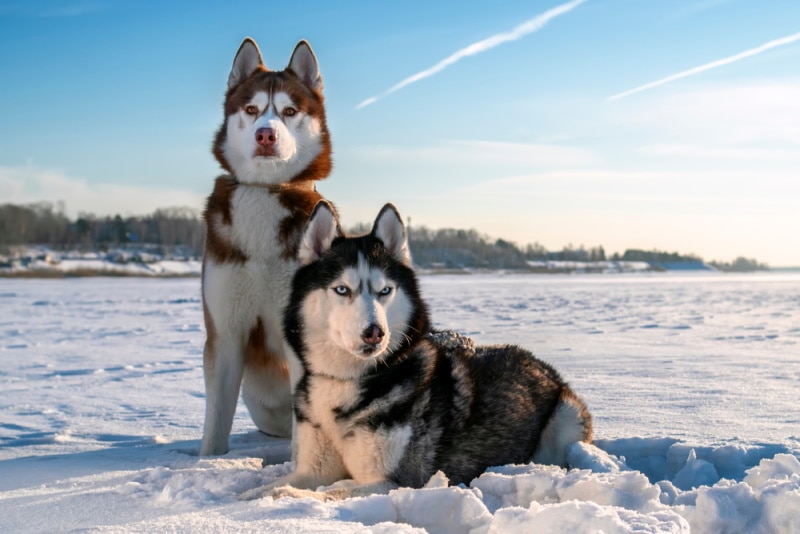
As another working dog turned household pet, the Husky was originally a versatile aid for northern native tribes, often toiling as sled dogs. The label can refer to several Husky breeds, including Labrador Huskies, Alaskan Huskies, and Chinook dogs. But the most popular breed, and the only one bearing the name in the American Kennel Club’s registry, is the Siberian Husky.
Despite a lengthy lineage spanning several thousand years, Siberian Huskies only became well-known within the last century. The breed was a sled dog for the Chukchi, an indigenous Siberian tribe. After arriving in Alaska in the early 1900s, they quickly became a staple in sled-dogging culture. In 1930, the AKC officially recognized the breed.
Personality
Huskies share many personality traits with Border Collies. They are energetic, friendly, and playful. You’ll have to give them plenty of daily exercise to avoid boredom and resultant destruction around the house.
Although they can be lovable and loyal to their owners, Huskies are often challenging to train due to their independence. They are vocal pets, preferring a yowl to a bark, and will test their owners.
Bred to be a high-octane and determined sled-pulling powerhouse, the Husky’s will can translate to mischievous actions in the home. Between their physical ability and mental fortitude, Huskies can be notably hard to handle for first-time dog owners. But as pack animals, they respond well to assertive alphas.
Family Friendliness
Since they’re adaptable and intelligent, Huskies fit in well with children and can make adjustments to suit their needs. As with any dog, socialization at an early age is essential. They may get mouthy, requiring a close eye and corrective action to limit nipping. For their part, children must also stay positive and avoid antagonizing the dog.
The Husky’s friendliness is beneficial around children and guests, as they need little introduction to warm up to others. On the other hand, it also makes them poor guard dogs. They’re not particularly protective. If given the proper attention, they’ll be as friendly to a burglar as they are to any family member.
That consideration for people and peers does not extend to smaller animals. Huskies retain a hunting instinct. While the Border Collie’s breeding has watered down most instincts to herding and chasing, Huskies will often harm cats, rabbits, and other undersized pets. Slow and patient introductions can allow them to coexist happily, but they are more challenging than most dogs.
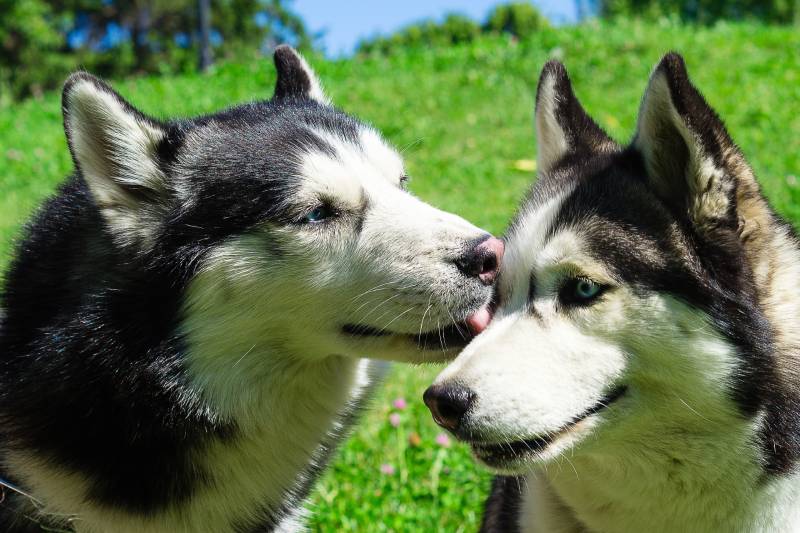
Grooming
From their dazzling eyes (the result of a genetic mutation) to their plush fur, Huskies are a beautiful breed. And fortunately, they don’t require much help to maintain their looks. Huskies are meticulous self-groomers, taking time to care for their coats and keep themselves odor-free.
Making life even easier, the Husky’s thick double coat generally doesn’t need trimming, though it will continually release hair. Fall and spring are heavy shedding seasons. They’ll typically need brushing 2–3 times weekly, and you should keep the vacuum ready when the weather shifts.
Beyond grooming, the Husky’s coat can add challenges to outdoor activity. Huskies are a northern breed, built to withstand cold weather. Though they’re adaptable to southern climates, you’ll have to watch for overheating and dehydration on hot summer days.
Suitable for:
Huskies and Border Collies are suitable for similar people. A Husky needs an active and attentive owner. You’ll be an excellent match if you enjoy outdoor activities and sports.
Prior experience with dogs is essential, as Huskies can be overwhelmingly needy and uncontrollable without the proper attention. They also need an appropriate setting. While they thrive in expansive areas where they can run, you must contain your dog. They’ll leap over fences and disregard commands when walking off the leash if they catch sight of prey. Without intense training, Huskies will wander, run off, and often get into trouble.
Border Collie vs. Husky: Which Is Better for Kids?
Border Collies are generally gentle dogs that are good with families. Their energy and herding instinct can be problematic, with small children running around without training. They may nip, bark, push, and chase, which could be frightening. At the same time, children will be unlikely to provide the disciplined, fast-paced activity a Border Collie demands.
Training your dog and your children to live amicably can be a chore, and you will need to be watchful over any interactions. Fortunately, Border Collies are devoted to their owners and pack. And when children engage with them positively, they’ll find Border Collies to be willing, goofy, and all-around fun play partners.
Huskies are naturally more inclined to get along with younger family members. But like Border Collies, they cannot receive the structure or activity level they need from children alone.
You must be the one to provide daily exercise to work out their bodies and minds. And when your kids and dog play, you’ll still need to supervise. Huskies are powerful creatures. While they’re relatively considerate, they can also easily knock over and harm small children.
Which Breed Is Right for You?
Neither Border Collies nor Huskies are for inexperienced or half-hearted pet parents. They demand training, tons of attention, and even more high-energy engagement if you want to keep yourself, your family, and your dog happy. But when you devote the time and effort, the payoff is enormous. Earning the respect, love, and loyalty of these hard-working breeds is richly rewarding, as are the physical benefits of keeping up with their boundless energy.
Featured Image Credit: (L) Pauline Loroy, Unsplash | (R) Regular Man, Unsplash





